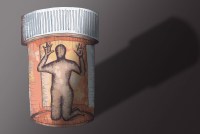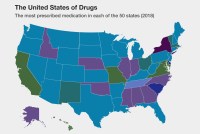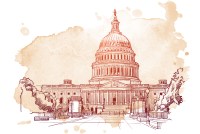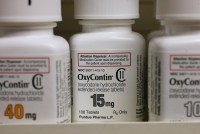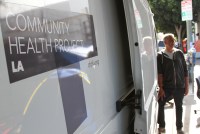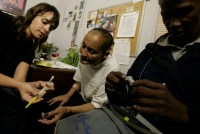Latest KFF Health News Stories
Manteniéndose vivo: cómo combatir la adicción a los opioides
Más de 42.200 estadounidenses murieron por sobredosis de opioides en 2016. Expertos dicen que una combinación de medicamentos y apoyo terapéutico puede combatir la adicción.
Staying Alive: How To Fight An Opioid Addiction
First of all, make sure you have an overdose reversal drug handy. Then prepare for years of vigilance and long-term medication.
Omissions On Death Certificates Lead To Undercounting Of Opioid Overdoses
Standards for how to investigate and report on overdoses vary widely across states and counties. As a result, opioid overdose deaths often go overlooked in the data reported to the federal government.
How Many Opioid Overdoses Are Suicides?
Opioid overdoses and related deaths are still climbing, U.S. statistics show. Teasing out which overdoses are intentional can be hard, but is important for treatment, doctors say.
Graphic: Opioid Painkiller Is Top Prescription In 10 States
Though opioid prescriptions appear to be on the decline, Vicodin and Norco remain popular, especially in the South. In more than half of states, Synthroid — a drug to treat hypothyroidism — came in at No. 1.
Congress Tackles The Opioid Epidemic. But How Much Will It Help?
President Trump, speaking Monday, called for a tough-on-crime federal approach. Meanwhile, on Capitol Hill, legislative strategies to combat this pressing public health problem are gaining momentum, but experts are not certain these approaches will make a difference.
The Other Opioid Crisis: Hospital Shortages Lead To Patient Pain, Medical Errors
A nationwide shortage of injectable opioid painkillers has left hospitals scrambling to find alternatives — in some cases leading to dosage mistakes that may harm patients.
Opioid Maker Funds Efforts To Fight Addiction: Is It ‘Blood Money’ Or Charity?
Purdue Pharma, whose signature product helped fuel the opioid epidemic, now wants to help treat it — or at least salvage its own reputation.
A Battered Doctor, A Slain Patient And A Family’s Quest For Answers
An addiction-treatment physician fatally shot a troubled ex-Marine after the man pummeled him inside his California office, police records show. The tragedy illustrates how the limited number of clinics available to prescribe buprenorphine, a drug that all but erases opioid withdrawal, can become crowded, chaotic and dangerous.
Jury’s In: Opioids Are Not Better Than Other Medicines For Chronic Pain
A new study followed patients with severe chronic pain for a year and found that opioids relieved pain and increased function no better than common drugs like acetaminophen and lidocaine. But the opioids carry the risk of more serious side effects, including addiction and death.
Estudio: los opioides no son mejores que otras medicinas para tratar el dolor crónico
Una nueva investigación revela que estos crontroversiales medicamentos no son eficaces para tratar el dolor de largo plazo.
While Talk About Opioids Continues In D.C., Addiction Treatment Is In Peril In States
The Trump administration has talked about prioritizing the opioid crisis, but states have seen little in the way of new resources. And, in some states, getting into treatment is becoming even harder.
Ten ERs In Colorado Tried To Curtail Opioids And Did Better Than Expected
The collaboration known as ALTO, Alternatives to Opioids, set out to reduce opioid doses in the emergency room by 15 percent. It managed a 36 percent reduction instead.
California To Drug Users: We’ll Pay For You To Test Your Dope
Fentanyl, a significant cause of overdoses and deaths across the country, has begun showing up in California street drugs. State health officials have responded with a bold but controversial policy: paying for test strips so users can check their stash.
La muerte de un tío por sobredosis impulsa a oficial de Medicaid a actuar
Un oficial de los Servicios de Medicare y Medicaid se enteró casi dos años después que uno de sus tíos más queridos había muerto víctima de las drogas. Esa verdad lo impulsó a un cambio de rumbo.
Opioid Crisis Hits Home: Uncle’s Overdose Spurs Medicaid Official To Change Course
Andrey Ostrovsky, who until last month was chief medical officer for Medicaid, quit his job so he could more directly fight the stigma of drug addiction.
Hospital Honchos Hone New Message In Wake Of Opioid Epidemic: Expect Pain
“We really do have a lot of responsibility and culpability,” says one hospital official who is part of a working group trying to address the opioid epidemic. Patients have to expect more pain after surgery and understand the risk of addiction, says another doctor.
An Opioid Remedy That Works: Treat Pain And Addiction At The Same Time
Studies show promising results for a treatment approach that tackles chronic pain and addiction together, but obstacles stand in the way of this integrated care.
Drug Overdose Deaths Soar Nationally But Plateau In Some Western States
Fatalities are climbing in states that have been flooded by the deadly opioid fentanyl, but are remaining flat — or even falling — in many Western states, where the drug has not yet been as common as other parts of the country.
Readers Have Bones To Pick, From Health System Flaws To Covering Pot Beat
Kaiser Health News gives readers a chance to comment on a recent batch of stories.



